|
If Lydia T谩r, the music conductor in Todd Field's film T谩r were called Ludwig, the story of power abuse would go down as familiar, without controversy. (The film was reviewed in these pages last month.) Famous conductors have recently been accused of sexual harassment of young artists, male or female, and three of them are mentioned in T谩r:
James
Levine
and
singer/conductor
Placido
Domingo
were
disgraced
and
banished
from
their
power
base
at
the
Metropolitan
Opera
in
New
York.
Swiss
conductor
Charles
Dutoit
suffered
a
"witch
hunt."
So
far,
we've
had
no
woman
among
this
elite,
but
the
fictional
character
of
Lydia
T谩r
is
so
close
to
our
contemporary
imagination
that
people
are
turning
to
Google
to
learn
more
about
her.
A good part of critics and social media went into hysterics over T谩r,
accusing
the
director
of
misogyny.
Public
opinion
rushed
to
condemn
the
protagonist
Lydia
as
a
"monster"
and
"predator,"
apparently
eager
to
tar
and
feather
her.
(Ironies
of
word
play
run
throughout
the
film:
Lydia's
autobiography
"T谩r
on
T谩r,"
for
example,
is
revengefully
altered
to
"Rat
on
Rat"
by
her
assistant
Francesca,
who
rats
on
her
in
the
end.
The
anagram
option
ART
remains
unspoken.
Art
and
beauty,
as
we
know,
are
in
the
eye
of
the
beholder,
but
so
is
misogyny,
and
Field
intentionally
provokes
with
his
brilliantly
conceived
and
executed
fable.
When
he
is
asked
about
all
the
"hot
button"
issues
in
his
film
(MeToo,
identity
politics,
"cancel
culture,"
etc.),
Field
keeps
a
poker
face,
insisting
that T谩r is not what it seems. He likes to use the term Rorschach as a key to the riddle. The term implies that you are looking at the movie, but what you see is your own reflection.
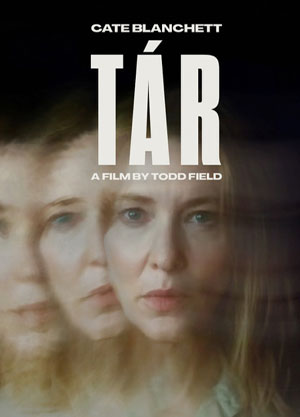
I watched T谩r repeatedly, running through different Rorschach
interpretations, each time thrilled with the way the writer/director and his
star Cate Blanchett keep the audience off-balance, ungrounded, in shock,
delight, and doubt. How many films can you remember portraying a
contemporary woman artist who is fully empowered and at the top of her
(male-dominated) field? The excitement over such a proposition and
accomplishment is inevitable. And the pain of seeing her go down in flames
is hard to bear. I was intrigued by my passionate feelings for Lydia T谩r and
my unwillingness to condemn her. I sensed a different meaning of the film
was hidden in its ambiguities, mysteries, and disturbing uncertainties.
My intention with this article is not a retelling of the plot (which my
colleague has already done), but to propose a different view, a Rorschach
reading of T谩r that has been overlooked. In my view T谩r is predominantly
a film about artistic inspiration and the artist's need for a Muse. In other
words, Lydia T谩r's story is about the artist's struggle with the magical and
demonic power of sexual passion.
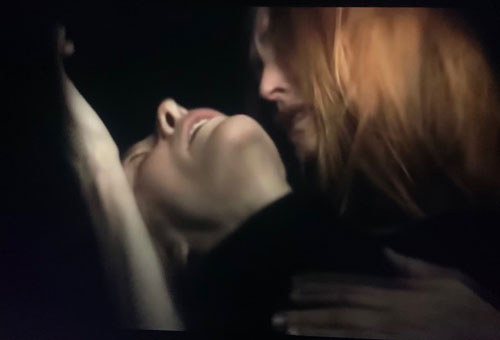
Throughout the movie, Field has set traps and clues, and the way he sets up
his story is significant: he makes Lydia T谩r irresistible. Her twenty-minute
interview at The New Yorker Festival, featuring critic and author Adam
Gopnik (playing himself) gives her an aura of unquestionable stardom. Cate
Blanchet, as Lydia T谩r, answers with elegant ease, unfazed by the towering
achievements Gopnik counts out for her. She seems charmed by the
intelligence of the back and forth, without showing any feminine ticks like
smiling, fawning, pretending humility, laughing at his (or her own) jokes,
or fussing with her hair. She looks luminous, perfectly androgynous with
her long straight hair, no makeup, in a cool pants suit. She casts a spell of
perfect mastery over her audience.
For a full first hour of a film about music, there is no music, none of the
orchestral tidal waves one might expect from Hollywood. Instead, the
silence allows one to hear undertones of ambiguity. Assistant Francesca
(No茅mie Morlant, Portrait of a Lady on Fire) is lip-synching parts of
Gopnik's laudatio like a prayer she knows by heart. Smart phone threads
show that people are watching Lydia with innuendos of infatuation and
malice. In the background, a woman with long red hair, seen only from the
back, is watching too.
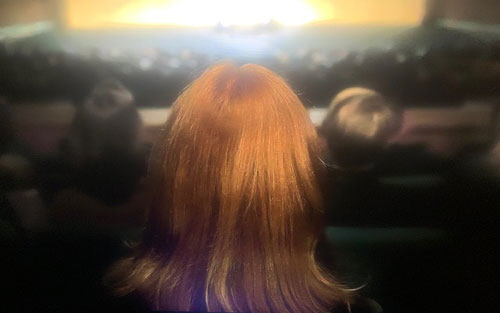
We soon learn that the observer looming in the background is Krista
Taylor (Sylvia Flote), an ex-lover who was a gifted mentee in Lydia's
fellowship for young women conductors. We learn that Krista is sending
increasingly desperate messages to Francesca, who is supposed to be a gate
keeper, but is also Krista's friend and go-between. Krista is trying to get
close to Lydia again, unable to understand why the affair is over and she is
left in the cold. We later learn that both Krista and Francesca spent
intimate time with Lydia in the Peruvian Amazon, where Lydia did a long
ethnographic study of a remote tribe. We know that both were budding
conductors, and most likely both were in love with Lydia. The difference is
that Francesca , whom everyone in the orchestra calls "the girl," meaning
Lydia's girl, tries to put her career before her feelings. Her ambition is to
become Lydia's Assistant Conductor, the number two at the Berlin
Philharmonic. Still, she also longs to be closer again to Lydia. These
intermingled relationships tell a very different story than the classic MeToo
drama of sexual harassment and predator behavior.
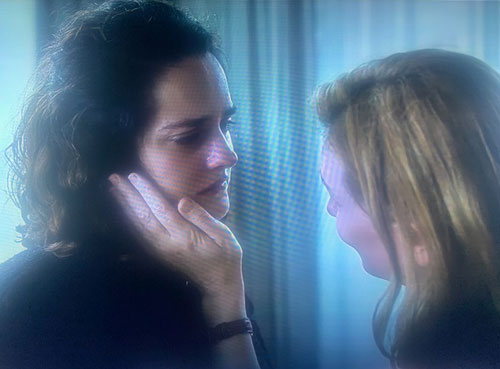
But back to the setup. It helps to know that the Amazon tribe, the Shipibo
-Conibo, really exists and is known for using labyrinth patterns in its
artifacts. They are also known for receiving songs by shamanic spirit
connection. Such a song is heard right after the first brief scene of the film
that shows a smart phone spying on the workaholic Lydia on a private jet.
The text thread comments: "what time did she get up this am" "i wasnt
with her s was" "our girls an early riser isnt she" "haunted" "ha you mean
she has a conscience" "maybe" "you still love her then." A moment later the
credits start rolling over a black screen while we hear the birdlike voice of a
girl or young woman singing in her tribal language. It's a long passage that
leaves the audience listening in the dark, puzzling over what this might
mean for the story to come. Next we see another glimpse of Lydia T谩r, the
artist, preparing in the wings. (The scene returns two more times, denoting
the radical changes in her state.) She is tense like a lion before the leap; her
breath comes out in sharp, controlled sniffs; her fingers seem to whip away
phantoms in front of her face, perhaps to clear the space for musical magic
to take over.
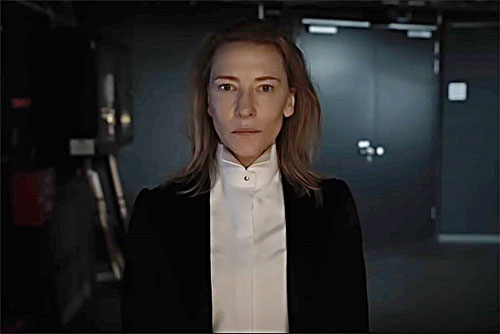
These first few minutes offer a rich tangle of themes: lovers' pursuits;
musical inspiration through unknown forces, be they magic or erotic; the
passionate effort to connect with the Muse. Lovers' pursuits also dominate
the next scene:
It's the reception following the New Yorker event. A pretty young woman
(Sidney Lemmon), a fan, engulfs the star in suggestive flattery, and Lydia
flirts right back. The fan asks if she is ever "overwhelmed" by the music she
conducts. Oh yes, she gets overwhelmed! There are "those spots…" Clearly
still on her "performance high" from the interview, Lydia evokes this state
with an engagement that barely hides its erotic overtones: "It's not that I'm
rushing, but oh, I just can't wait to get to that spot, and yeah, it does it, does
it every time." The fan reacts with a sensuous shudder and Lydia carries on,
enthusing over Stravinsky's Rite of Spring: "It's the eleven pistol shots –
the prime number! – it strikes you as both victim and perpetrator. It's not
until I conducted it that I became convinced we're all capable of murder!
That's a fantastic handbag by the way" – in a sudden swoop from the
heights of murder she fastens on the blood red handbag the fan is wearing.
Assistant Francesca rolls her eyes in comical (jealous?) exasperation and
urges Lydia away to her next appointment. "Can I text you?" the besotted
fan implores her. Ah, the dangers of texting!
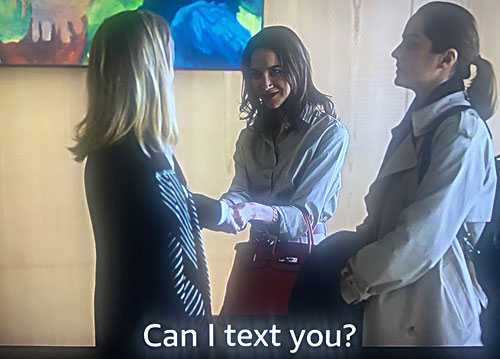
The scene is a good example of Field's complexity and ambiguity: where is
the perpetrator, he seems to ask, where is the victim? It takes two to tango.
Sharon, Lydia's spouse of many years (Nina Hoss), instantly notices the red
handbag when Lydia returns to Berlin. Lydia lies about the bag and quickly
adds, "Would you like it?" -- an expression of guilty generosity, or of the
ease with which the one-night-stand, the woman and her gift, become
irrelevant? And is Sharon's reply, "No. It suits you!" a tacit
acknowledgment of something she is used to and shrugs off? Sharon holds
the powerful position of concertmaster (first violin). The two are a high
-power professional team, a couple who "has it all" (including an adopted
little daughter who loves and trusts Lydia) -- all except sexual passion and
time to look at the silences in their relationship.

This is, of course, where Krista Taylor comes in. The only sexual scene in
the film is Lydia's dream of being seduced by Krista and surrendering in
ecstasy. The powerful moment is shown in a slight variation in a trailer
called "T谩r – The Teaser." Both times, it is striking to see Lydia, not in the
pose of the seducer, harasser, predator etc., but the opposite. The director
gives us food for thought: what must it be like for a powerhouse like Lydia,
who controls a huge orchestra, a whole administration, boards and
fellowships, to surrender to the spell of a gifted lover?

The additional materials and scenes of "The Teaser" are about the haunting
effects of losing control – to indigenous magic and demonic spells mixed
with eros. We are shown Lydia's face being painted by a tribal person with
the lines of a maze, a design in black and white. We also see Krista, her face
covered with the same labyrinth that returns to haunt Lydia. The labyrinth
is also evoked in the repeated over-head shots of the Berlin Philharmonic
concert hall with its extraordinary architecture and orchestra setup. And it
poignantly reemerges in the final gift Krista leaves for Lydia in New York: a
signed American first edition of Vita Sackville West's novel Challenge, with
the same ominous labyrinth sketched over the cover page.
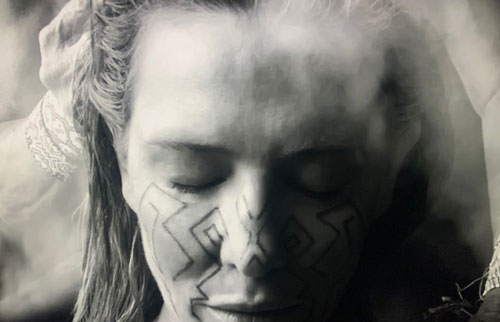
It helps to know that the book is a roman 脿 clef about Vita's passion for
novelist Violet Trefusis, who used to threaten suicide whenever Vita
returned to her husband. Vita and Violet collaborated on the book while
they had fled to the south of France. Vita did return home in the end and
finished the book, but withheld it from publication in England for fear of
scandal. (I leave it to academics to puzzle out if this collector's item could
have been signed by the author!)
This loaded gift has to be an allusion to Krista's dream of collaborating with
her idol and writing some musical chapter together. When Lydia unwraps
the book in the air plane toilet, away from Francesca's eyes, she tears out
the labyrinth page, and, with trembling hands, stuffs the whole thing,
wrapping and all, in the waste slot. The heroine of Challenge kills herself at
the end – and a couple of days later, so does Krista.

This is the elephant in the room of T谩r: passion can certainly be
experienced as an overwhelming, obsessive labyrinth without an exit.
Giving in to passion would have derailed Lydia's career and caused a
scandal with Sharon and the Berlin Philharmonic – something Lydia had to
avoid at all cost. At the end of the airplane scene, when Lydia gets back to
her seat, she is shown obsessing over Krista Taylor's name, forming
anagrams and partial words with its letters: "krait" (a highly venomous
snake), "trol" etc. It seems like a helpless attempt to find a counter-spell to
the haunting appeal of the lover who won't let go of her. Later, when the
scandal erupts, she is challenged by a Philharmonic committee to reveal
what Krista Taylor did to her. All she can say is that Krista fixated on her,
trolled her, sent her weird gifts, tried to send her "signals." The worst she
comes up with, and her most honest admission, is: "She vandalized my
Wikipedia page to say she was my Muse."
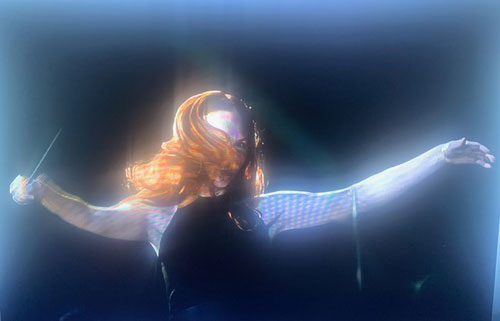
Lydia seems to be like many artists who draw inspiration from the "Muse"
in the shape of a young woman. Her apparent dependance on falling in
love to sustain her creativity has run dry with the end of the affair. We see
her repeatedly at the piano, trying to compose her own music, and failing
rather miserably. One surely has to wonder how Krista's persistent claim
on her could warrant the brutal rejection Lydia inflicted on her by
blacklisting Krista with a number of major orchestras. The cruel "ghosting"
seems so over the top that it gives one pause. It seems a desperate,
unhinged attempt to ban her completely from Lydia's professional orbit, as
if any sign or appearance of Krista in the music world were a clear and
present danger. What sort of threat, we must ask, could this budding
conductor be to the all-powerful Lydia? What could create such a degree of
panic? I can only find one psychologically convincing answer: the threat of
temptation, the panic of getting pulled back into the same sexual spell, the
ecstatic surrender we are shown. Lydia knows no better exorcism of this
haunting desire.
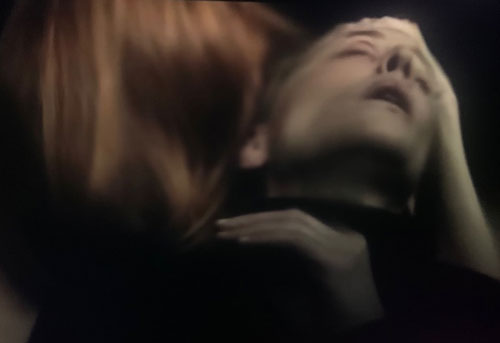
Another desperate attempt to flee and forget is her flirtatious fondness for
Olga (Sophie Kauer), the gifted new cellist who prefers men. We see Lydia
running after this new ersatz "Muse" -- and running straight into another
labyrinth, this time a literal underworld of a spooky squat house. The black
giant dog threatening at the end of a hallway is perhaps a hallucination, a
metaphor. He is the Minotaur, and there is no Ariadne to protect her: she
stumbles out in panic and brutally falls. It's the fall from grace, the
unavoidable and unstoppable downfall.
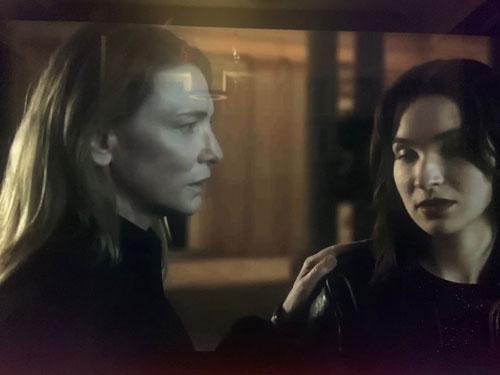
And finally, another haunting question that remains ambiguous and calls
for decoding: why doesn't Lydia fight back against the tabloid scandal
mongers, the rumor mill, the grossly falsified video "evidence"? She of all
people has the stuff it would take, as we are shown in numerous scenes
where she is a power player, outsmarting her envious male rivals, putting
competitors in their place, and always ready with an argument or retort
that leaves them speechless. She is a runner; she pummels a punching ball
at the Philharmonic gym to contain her fury. In short, she knows how to
run with the wolves – and what a pleasure it is to watch her speed and
brilliance. She could do what her real-life colleagues Placido Domingo,
James Levine or Charles Dutoit have done: get a slew of top lawyers to
deny the charges.
But interestingly, Lydia has no defense. She remains silent, not only
because her not so loyal assistant Francesca has kept all the emails and
turned against her. In her growing panic over the fallout of Krista's suicide
Lydia has lost control and made unforgivable mistakes. If she stepped up to
her own defense she would have to go into the details of her sexual
passions and her betrayals of Sharon. She would have to deal with the true
reasons for her brutal abuse of power against Krista and its tragic ending.
She simply has no choice but to suck it up and start again from scratch,
from the bottom.

I read that Todd Field and his star don't see the ending as all that
depressing. I agree. It's certainly a fantastic irony to witness the first
concert of her new career. Lightyears away from the ethereal world of
classical music, she is now part of pop culture, serving a young generation
"boldly going where no one has gone before" – a generation sufficiently
affluent to afford live music with a full orchestra for its games.
|